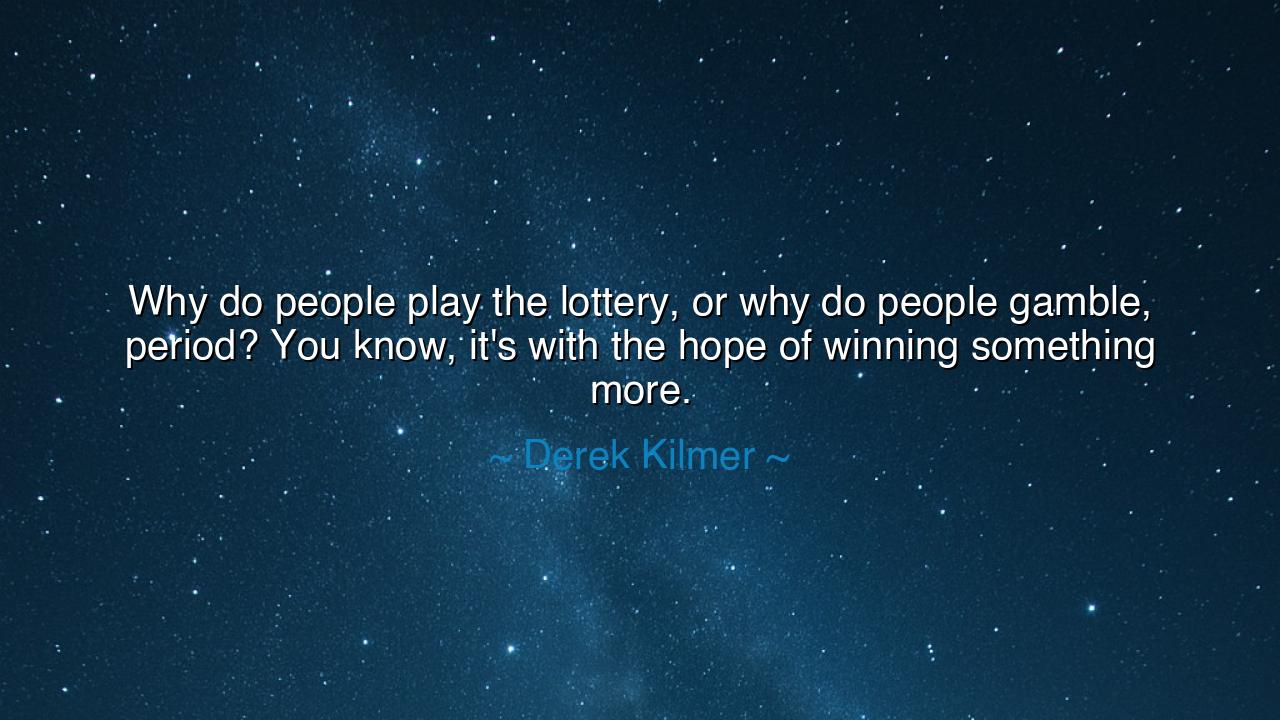
Why do people play the lottery, or why do people gamble, period?
Why do people play the lottery, or why do people gamble, period? You know, it's with the hope of winning something more.






The congressman Derek Kilmer, a man known for his thoughtful approach to society’s struggles and hopes, once said: “Why do people play the lottery, or why do people gamble, period? You know, it’s with the hope of winning something more.” These words, simple and conversational in tone, conceal a timeless truth about the human spirit—the yearning for something more, something beyond the confines of ordinary life. Kilmer was not merely speaking of gambling in the literal sense, but of the universal longing that drives men and women to take chances, to dream, and to reach for a better tomorrow, even when the odds are impossibly long.
At the heart of his statement lies an understanding of hope—that sacred fire which refuses to die even in the darkest night. People gamble not only with money, but with time, with trust, with their hearts and ambitions. Behind every risk, behind every throw of the dice, there is a hidden prayer: that life might surprise us with mercy, that fortune might smile just once more. This impulse is neither foolish nor shameful—it is deeply human. It is the same impulse that built empires, discovered continents, and inspired songs and revolutions. For though reason warns us of the odds, hope whispers of miracles.
The origin of Kilmer’s reflection lies in his concern for the economic struggles of everyday Americans. He observed how those who feel trapped by circumstance often turn to the lottery or casinos as symbols of escape. To the wealthy, gambling is a game; to the poor, it is a doorway to possibility. Yet Kilmer’s words reach beyond economics—they touch the human heart itself. For even those who have all they need still gamble, in their own way: gambling on love, on dreams, on the uncertain road of destiny. His quote reminds us that every soul hungers not merely to exist, but to win something more—to feel that life holds meaning, joy, and transformation still within reach.
History offers countless examples of this yearning. Consider the story of the prospectors during the California Gold Rush. They left behind families, homes, and safety, crossing mountains and deserts in the hope of striking fortune. Few ever found gold, but all were fueled by the same invisible force that drives a gambler’s hand: the hope that the next turn of fate might change everything. And though many returned poor, they carried within them something richer—the knowledge that they had dared to hope, dared to try, dared to reach beyond the ordinary. For as much as gambling is about gain, it is also about the human refusal to give up on the possibility of greatness.
Yet Kilmer’s words also carry a gentle warning. Hope, without wisdom, can become a trap. To chase endlessly after chance, neglecting effort, is to hand one’s life to the winds. The ancients taught that true fortune favors the prepared, not the idle. Thus, while hope gives the courage to risk, it must be balanced with labor, discipline, and patience. The farmer does not merely pray for rain—he plows the soil first. The gambler’s error is not that he hopes, but that he hopes without building the foundation upon which fortune may fall. Kilmer’s observation, then, is not a condemnation of hope—it is a call to understand it rightly: to let it inspire, not enslave.
To live wisely is to know when to gamble and when to build. Every great achievement requires a measure of risk—a leap into the unknown. But the wise risk-taker does not depend solely on luck. He combines hope with preparation, chance with courage, dream with diligence. The inventor who toils for years on a vision, the artist who dares to create, the reformer who challenges injustice—all gamble with their time and their hearts. They too seek “something more,” but their gamble is guided by purpose, not by blind chance.
So, my child, take this teaching to heart: it is not wrong to hope for more, for hope is the soul’s breath. But let your hope be active, not idle. Do not throw your life into the hands of luck, but place it in the hands of work, courage, and faith. Seek your “something more” not in the promise of chance, but in the power of persistence. For fortune, like fire, answers not to the idle wish, but to the steady spark. And when your heart burns with that kind of hope—fueled by labor, guided by wisdom—you will find that life itself, even without the lottery’s prize, becomes the greatest of all winnings.






AAdministratorAdministrator
Welcome, honored guests. Please leave a comment, we will respond soon